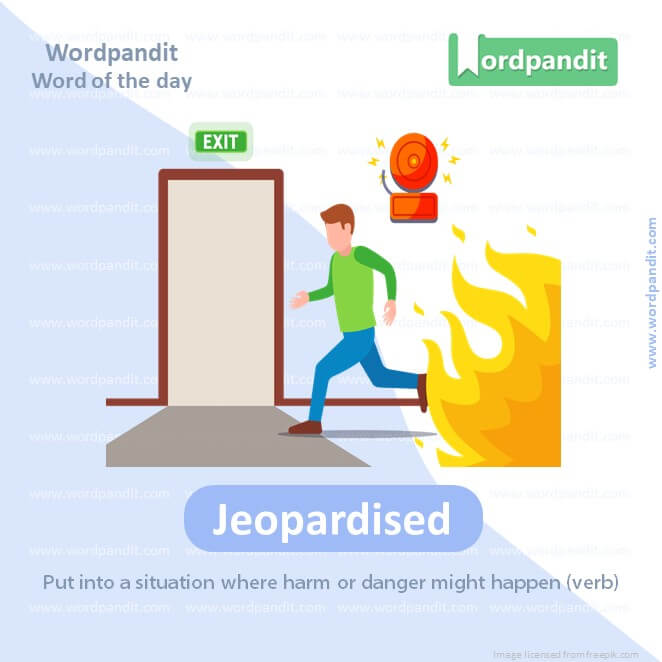Daily Vocabulary Words: List of Daily Used Words in Leading Indian Newspapers
Hi there. Welcome to this special section @ Wordpandit. Our endeavour here is straightforward: highlighting daily vocabulary words that you would come across in leading newspapers in the country. We have included the following newspapers in our selection:
• The Times of India
• The Economic Times
• Hindustan Times
• Mint
• Indian Express
We are putting in extensive work to develop your vocabulary. All you have to do is be regular with this section and check out this post daily. This is your repository of commonly used words; essentially, we are posting a list of daily used words. Hence, this has significant practical application as it teaches you words that are commonly used in leading publications mentioned above.
Visit the website daily to learn words from leading Indian newspapers.

WORD-1: Stakeholders
CONTEXT: A possible reason for this is “pre-screening” of the petition by stakeholders assisting the woman
SOURCE: Indian Express
EXPLANATORY PARAGRAPH: Imagine you have a big puzzle with many pieces. Each piece is important to complete the whole picture. Similarly, in a project or a business, there are many people involved who have something important to do or something at risk. These people are called stakeholders because they hold a “stake” or a part in that project or business.
MEANING: Individuals or groups who have an interest or concern in a particular task or decision. (noun)
PRONUNCIATION: Stayk-hohl-ders
SYNONYMS: Participants, Interested parties, Shareholders, Investors, Partners, Collaborators
USAGE EXAMPLES:
– Many stakeholders attended the company meeting.
– The decision will impact all stakeholders.
– Feedback from stakeholders was crucial for the project’s success.
– The interests of different stakeholders must be balanced.

WORD-2: Arduous
CONTEXT: the journey through the legal and medical systems is often arduous
SOURCE: Indian Express
EXPLANATORY PARAGRAPH: Imagine climbing a really big and steep mountain. It’s hard and tiring, right? When something is very hard to do, we can say it’s arduous.
MEANING: Requiring a lot of effort and hard work. (adjective)
PRONUNCIATION: Ar-joo-us
SYNONYMS: Difficult, Taxing, Strenuous, Exhausting, Challenging, Grueling, Tough
USAGE EXAMPLES:
– The trek to the peak was an arduous journey.
– Studying for the exam was an arduous task.
– The team faced an arduous challenge ahead.
– She completed the arduous training program.

WORD-3: Dehumanising
CONTEXT: frustrating and dehumanising. Women must undergo medical examination by a panel of doctors even when multiple medical reports are appended to the petition.
SOURCE: Indian Express
EXPLANATORY PARAGRAPH: Imagine if someone treated you like a toy and not like a real person. That would feel bad, right? Dehumanising is when people treat others like they’re not real humans with feelings.
MEANING: Making someone feel less human and more like an object. (verb)
PRONUNCIATION: Dee-hyoo-muh-nizing
SYNONYMS: Belittling, Degrading, Depersonalizing, Objectifying, Insulting, Humiliating, Disrespecting
USAGE EXAMPLES:
– Bullying is a dehumanising act.
– The treatment of prisoners was dehumanising.
– The movie portrayed the dehumanising effects of war.
– Such behavior is dehumanising and unacceptable.

WORD-4: Emancipation
CONTEXT: It is time to analyse if the great reformer stood for women’s social, educational, cultural and religious emancipation.
SOURCE: Indian Express
EXPLANATORY PARAGRAPH: Imagine a bird that’s trapped in a cage and then one day the cage door opens and it’s free to fly. Emancipation is like that; it’s about setting someone free from control or limits.
MEANING: The act of setting someone free from restrictions or control. (noun)
PRONUNCIATION: Ee-man-si-pay-shun
SYNONYMS: Liberation, Freedom, Release, Deliverance, Unshackling, Manumission, Enfranchisement
USAGE EXAMPLES:
– The emancipation of slaves was a historic moment.
– Women fought for their emancipation and rights.
– The film discussed the emancipation of a suppressed society.
– His writings played a role in the emancipation of his country.

WORD-5: Jeopardised
CONTEXT: Education, according to him, seriously jeopardised women’s ultimate purpose of life
SOURCE: Indian Express
EXPLANATORY PARAGRAPH: Imagine you throw a stone in a pond. You’ll see ripples spreading out, right? That’s dangerous! When something is put in danger or at risk, we say it’s jeopardised.
MEANING: Put into a situation where harm or danger might happen. (verb)
PRONUNCIATION: Jeh-puh-dized
SYNONYMS: Endangered, Risked, Imperiled, Threatened, Compromised, Menaced, Undermined
USAGE EXAMPLES:
– His actions jeopardised the team’s chances of winning.
– Careless driving jeopardised the safety of others.
– Their relationship was jeopardised by mistrust.
– She jeopardised her health by working too hard.
WORD-6: Exemplary
CONTEXT: It is my cherished desire that exemplary and good quality education be imparted to women
SOURCE: Indian Express
EXPLANATORY PARAGRAPH: Imagine someone doing something so well that others want to be like them. Exemplary is like getting a gold star because you did something really, really well.
MEANING: Serving as a perfect example; of very high standard. (adjective)
PRONUNCIATION: Eg-zem-pluh-ree
SYNONYMS: Outstanding, Excellent, Ideal, Model, Superior, Admirable, Laudable
USAGE EXAMPLES:
– She received an award for her exemplary work.
– The teacher’s behavior was exemplary.
– The athlete set an exemplary standard for others to follow.
– Their dedication to the cause was exemplary.
WORD-7: Intriguing
CONTEXT: It is intriguing that Sir Syed threw his weight behind gender segregation.
SOURCE: Indian Express
EXPLANATORY PARAGRAPH: Have you ever seen a magic box and wanted to know what’s inside? That feeling of curiosity and interest is what we call intriguing.
MEANING: Very interesting and causing curiosity. (adjective)
PRONUNCIATION: In-tree-ging
SYNONYMS: Fascinating, Captivating, Engaging, Enthralling, Beguiling, Riveting, Mesmerizing
USAGE EXAMPLES:
– The book had an intriguing storyline.
– The scientist made an intriguing discovery.
– She found the painting very intriguing.
– The movie’s trailer was intriguing and made me want to watch it.
WORD-8: Jurisprudence
CONTEXT: They argue these provisions run counter to jurisprudence on the right to privacy.
SOURCE: Times of India
EXPLANATORY PARAGRAPH: Think of all the rules and laws that help us live together nicely. Jurisprudence is like a big book that talks about these rules and why and how they work.
MEANING: The study of law and legal principles. (noun)
PRONUNCIATION: Joor-is-proo-dens
SYNONYMS: Legal theory, Legal philosophy, Law studies, Legal science, Law doctrine, Law principles
USAGE EXAMPLES:
– He is an expert in criminal jurisprudence.
– The seminar covered topics in environmental jurisprudence.
– Modern jurisprudence has evolved over time.
– She wrote a book on the jurisprudence of human rights.
WORD-9: Traceability
CONTEXT: the technical aspect of making changes to these apps that allow for traceability of the originator.
SOURCE: Times of India
EXPLANATORY PARAGRAPH: Imagine you have a toy train and you can see its tracks, so you know where it’s been. Traceability is like being able to see and understand where something comes from or where it’s been.
MEANING: The ability to trace or track the origin and movements of something. (noun)
PRONUNCIATION: Tray-see-uh-bil-ity
SYNONYMS: Trackability, Detectability, Traceableness, Searchability, Findability, Locatability, Identifiability
USAGE EXAMPLES:
– The company ensures the traceability of its products.
– The traceability of the goods was lost in transit.
– Improved systems have enhanced food traceability.
– Traceability is important for consumer confidence.
WORD-10: Ramifications
CONTEXT: the question of oversight on governments breaching privacy under some circumstances. The second issue has wide ramifications.
SOURCE: Times of India
EXPLANATORY PARAGRAPH: Imagine you throw a stone in a pond. You’ll see ripples spreading out, right? That’s like the word “ramifications” – they are the things that happen as a result of a decision or action.
MEANING: The consequences or results that follow a particular action or decision. (noun)
PRONUNCIATION: Ram-if-ih-kay-shuns
SYNONYMS: Consequences, Repercussions, Outcomes, Results, Aftereffects, Implications, Effects
USAGE EXAMPLES:
– The decision had several unexpected ramifications.
– He did not consider the ramifications of his actions.
– The policy had both positive and negative ramifications.
– The study explored the economic ramifications of climate change.
Vocabulary Meaning and Examples
In the fascinating world of language learning, a method particularly impactful is learning ‘vocabulary meaning and examples’. Harnessing this dual approach of understanding words through definitions and relevant examples yields a sound vocabulary grasp. Let’s explore how we can effectively learn vocabulary using ‘meaning and examples’.
Foremost, recognizing ‘meaning and examples’ involves more than just a surface glance at the definition. It requires an engaged interaction with the word, placing it within a proper context. This enriches comprehension and facilitates an innate understanding of the word’s applications.
The process of learning ‘meaning and examples’ is made highly effective through varied resources. Reading literature, online articles, and language learning platforms offer numerous examples enriching the meanings. By frequently encountering a word in various contexts, the understanding of the ‘meaning and examples’ deepens, imprinting the word into long-term memory.
When learning ‘meaning and examples’, creating personal sentences is recommended. Develop your own examples using the given word. This personal connection between learned vocabulary and your everyday life context strengthens both familiarity and recall.
Moreover, taking notes while studying ‘meaning and examples’ goes a long way in mastering vocabulary. Jotting down the definition and a couple of examples for reference leads to better recall during revisions.
Finally, teach to learn. A tried-and-true method to solidify ‘meaning and examples’ is by explaining the word to someone else. This exercise forces you to articulate the word’s usage and understanding clearly, embedding it further in your memory.
In conclusion, the journey to learn ‘vocabulary meaning and examples’ is a rewarding process that involves a multifaceted approach. As you dive into the rich experience of understanding words through ‘meaning and examples’, you uncover the nuance and depth of language, enabling you to master it in its true sense.













